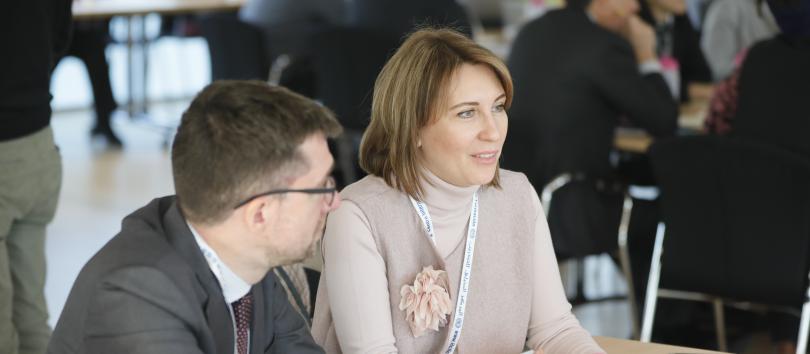
Validation of prior learning: How ETF partner countries can learn from each other
Participants at a European Training Foundation international conference on “advancing validation of non-formal and informal learning (VNFIL)” co-hosted in Ankara by the Turkish Vocational Qualifications Authority, saw for themselves how a well-organised national system can support both individuals and businesses in getting the best out of people.
Delegates from countries that included ETF partners in Ukraine, the Western Balkans, Central Asia and the Caucasus – as well as international experts from EU member states – witnessed Türkiye’s well-developed VNFIL system at first hand.
At Ankara-based MYM Authorised Certification Body – one of the country’s 270 official testing centres – they saw how the system works, as two scaffolding technicians were put through their paces.
Building a safe and secure scaffolding platform is a skill taught at many vocational technical training schools throughout the world. Sometimes it is a skill learned on the job, with no formal qualifications. Those with practical skills often possess an advantage in labour markets that need job-ready workers. But the lack of a formal qualification can hamper career progression or job security.
First, test paperwork in a sealed envelope was opened by a test invigilator under the watchful eye of a video camera – one of two set up to record the exam. The inspector formally identified himself on camera, showing his ID card, a process repeated by the two examinees. Formalities out of the way, the tasks – to build a two-storey L-shaped scaffold got underway, but not before both men had donned the correct protective equipment, including helmet, glasses, gloves and safety harnesses.
Once the scaffolding was completed, with all safety notices and devices (such as guard rails and anti-trip boards) displayed, the test concluded with the inspector signing off on documentation before it was placed in another sealed envelope for submission. Again, all on camera.
The process is repeated across all a wide range of professions that are open to certification of prior learning in Türkiye. To date, more than 2.5 million certificates have been issued, demonstrating the high regard the Turkish public have for the system.
Close involvement with employers – as demonstrated at another site visit to the TOBB (Union of Chamgers and Commodity Exchanges of Türkiye) centre in Ankara – is a key feature of a system that is prized by the country’s Vocational Qualifications Authority as a major contributor to education system and labour market flexibility.
“Young people train until about the age of 20, but today the rapid pace of change means that life-long learning is much more important,” Mustafa Balci, of the EU Delegation to Türkiye, noted. “We learn only around eight to ten percent of the information we shall be learning during our lives up to this point.”
Systems for validating prior learning exist in all of the ETF’s partner countries, but the extent to which systems operate vary widely – with most countries displaying low take-up in the vocational education and training sector, and only a few having high scores for labour market testing in countries that include Jordan, Kazakhstan, Turkey and Ukraine.
A central aim of the three-day conference was to share best-practice and launch a plan for an international network to support development of VNFIL across participating countries.
Reflecting on what they had learned about the Turkish certification system, participants agreed that it was a strong system, but felt there was not enough emphasis on how individuals fared after they earned recognition of their prior learning – whether it was in construction, catering or real estate sales.
Other key questions raised included whether learning outcomes were transferable – whether the certificates opened up new pathways for further training; and whether measures were in place to encourage greater gender balance – the vast majority of those taking advantage of the system were men, delegates learned. There were also concerns about the amount of support individuals could access before, during and after the certification process.
The low cost of the system to individuals – the average cost, where charged, was around €100 – and a free re-test offered to those who failed first time round – won plaudits from conference participants.
The conference concluded with presentations on best practice from around Europe, including that of Sweden’s National Agency for Higher Vocational Education, where a three-year pilot project to merge VNFIL into the advanced system of vocational training (EQF levels 5-6) was recently formally adopted.
The Swedish system combines a robust system of per capita funding – with a fixed sum of around €1,000 paid to training institutions per student simply to establish their professional level – with further funding for flexible training programs that enable most participants to halve the time taken to achieve formal qualifications that are the same as those acquired by full-time higher VET students.
In an online presentation, Anna Kahlson, Senior Advisor, Swedish Agency for Higher VET, said: “If you want validation, you need to integrate it into your training system, and need to have funding models that support it. The pilot we ran showed us that this way of doing it contributed to faster and more flexible learning pathways.
“The model combines both validation and complementary training.”
She left the last words to a 47-year-old elderly care home worker who took part in the pilot. The woman was keen to progress to becoming an assistant speciality nurse for geriatric care. The usual college programme to achieve a certificate for this would take two years. With her prior experience validated and taken into account, she was able to take the course in six months with part-time study.
“We tend to under-estimate the skills we have gained during our professional lives” the woman told Ms Kahlson. “This flexible programme gives value to that experience.”
Did you like this article? If you would like to be notified when new content like this is published, subscribe to receive our email alerts.